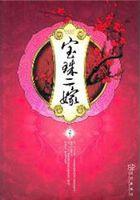"We will never abandon the right to the mouth of the Mississippi."That, in all such arguments, is a strong point with men of the Northern States--perhaps the point to which they all return with the greatest firmness. It is that on which Mr. Everett insists in the last paragraph of the oration which he made in New York on the 4th of July, 1861. "The Missouri and the Mississippi Rivers," he says, "with their hundred tributaries, give to the great central basin of our continent its character and destiny. The outlet of this system lies between the States of Tennessee and Missouri, of Mississippi and Arkansas, and through the State of Louisiana. The ancient province so called, the proudest monument of the mighty monarch whose name it bears, passed from the jurisdiction of France to that of Spain in 1763. Spain coveted it--not that she might fill it with prosperous colonies and rising States, but that it might stretch as a broad waste barrier, infested with warlike tribes, between the Anglo-American power and the silver mines of Mexico. With the independence of the United States the fear of a still more dangerous neighbor grew upon Spain; and, in the insane expectation of checking the progress of the Union westward, she threatened, and at times attempted, to close the mouth of the Mississippi on the rapidly-increasing trade of the West. The bare suggestion of such a policy roused the population upon the banks of the Ohio, then inconsiderable, as one man. Their confidence in Washington scarcely restrained them from rushing to the seizure of New Orleans, when the treaty of San Lorenzo El Real, in 1795, stipulated for them a precarious right of navigating the noble river to the sea, with a right of deposit at New Orleans. This subject was for years the turning-point of the politics of the West; and it was perfectly well understood that, sooner or later, she would be content with nothing less than the sovereign control of the mighty stream from its head-spring to its outlet in the Gulf. AND THAT IS AS TRUE NOW AS IT WAS THEN."This is well put. It describes with force the desires, ambition, and necessities of a great nation, and it tells with historical truth the story of the success of that nation. It was a great thing done when the purchase of the whole of Louisiana was completed by the United States--that cession by France, however, having been made at the instance of Napoleon, and not in consequence of any demand made by the States. The district then called Louisiana included the present State of that name and the States of Missouri and Arkansas--included also the right to possess, if not the absolute possession of all that enormous expanse of country running from thence back to the Pacific: a huge amount of territory, of which the most fertile portion is watered by the Mississippi and its vast tributaries. That river and those tributaries are navigable through the whole center of the American continent up to Wisconsin and Minnesota. To the United States the navigation of the Mississippi was, we may say, indispensable; and to the States, when no longer united, the navigation will be equally indispensable. But the days are gone when any country such as Spain was can interfere to stop the highways of the world with the all but avowed intention of arresting the progress of civilization. It may be that the North and the South can never again be friends as the component parts of one nation. Such, Itake it, is the belief of all politicians in Europe, and of many of those who live across the water. But as separate nations they may yet live together in amity, and share between them the great water-ways which God has given them for their enrichment. The Rhine is free to Prussia and to Holland. The Danube is not closed against Austria. It will be said that the Danube has in fact been closed against Austria, in spite of treaties to the contrary. But the faults of bad and weak governments are made known as cautions to the world, and not as facts to copy. The free use of the waters of a common river between two nations is an affair for treaty; and it has not yet come to that that treaties must necessarily be null and void through the falseness of politicians.
"And what will England do for cotton? Is it not the fact that Lord John Russell, with his professed neutrality, intends to express sympathy with the South--intends to pave the way for the advent of Southern cotton?" "You ought to love us," so say men in Boston, "because we have been with you in heart and spirit for long, long years. But your trade has eaten into your souls, and you love American cotton better than American loyalty and American fellowship." This I found to be unfair, and in what politest language I could use I said so. I had not any special knowledge of the minds of English statesmen on this matter; but I knew as well as Americans could do what our statesmen had said and done respecting it. That cotton, if it came from the South, would be made very welcome in Liverpool, of course I knew. If private enterprise could bring it, it might be brought. But the very declaration made by Lord John Russell was the surest pledge that England, as a nation, would not interfere even to supply her own wants. It may easily be imagined what eager words all this would bring about; but I never found that eager words led to feelings which were personally hostile.
All the world has heard of Newport, in Rhode Island, as being the Brighton, and Tenby, and Scarborough of New England. And the glory of Newport is by no means confined to New England, but is shared by New York and Washington, and in ordinary years by the extreme South. It is the habit of Americans to go to some watering-place every summer--that is, to some place either of sea water or of inland waters. This is done much in England, more in Ireland than in England, but I think more in the States than even in Ireland.















